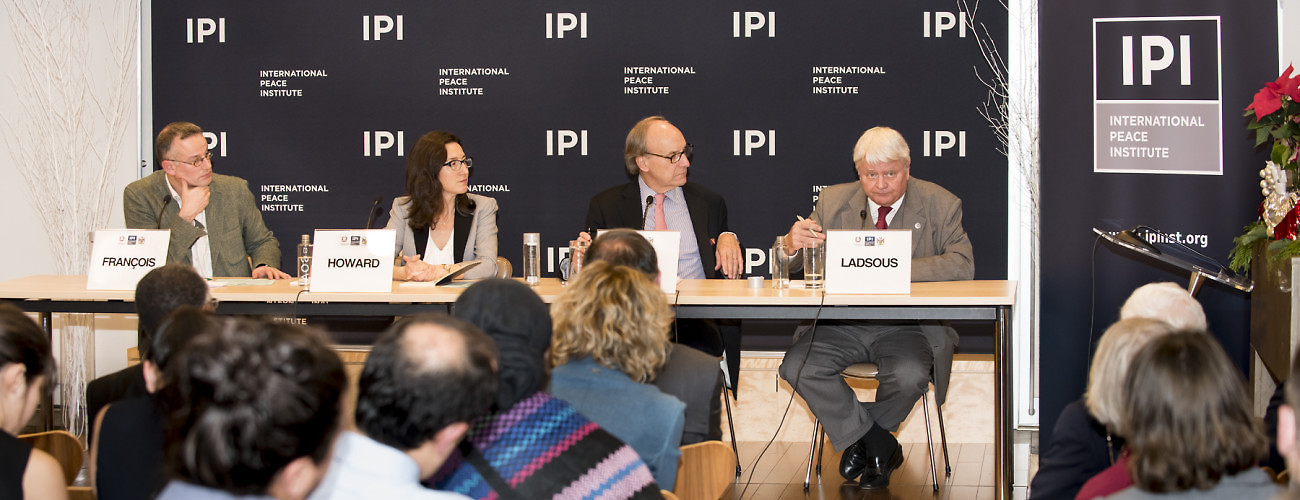To an overflow audience on December 2nd, IPI screened a new documentary film, “The United Nations: Last Station Before Hell,” that explores the central challenges in UN peacekeeping through field investigations and interviews with key decision makers. Afterwards, an expert panel shared their reactions to the film and their thoughts about the future of peacekeeping.
The film gets its name from a phrase employed by former Under-Secretary-General for Peacekeeping Operations Jean-Marie Guéhenno in an interview for the film. For millions of people in conflict zones, he said, UN peacekeepers serve to keep people from falling victim to violence, representing “the last station before hell.”
Sebastiano Cardi, Permanent Representative of Italy to the UN, emphasized that his country is the top Western troop contributing country to peacekeeping operations. “Our commitment to UN peacekeeping is steadfast,” he said. “It is important that we all reflect on the future of peacekeeping.”
Wilfried I. Emvula, Permanent Representative of Namibia to the UN, also one of the subjects interviewed for the documentary, said Namibians “regard ourselves a product of peacekeeping,” due to the role of the UN Transitional force in 1989-90, which enabled the country’s peaceful transition to its independence.
Pierre-Olivier François, the film’s director, said the documentary format enabled a look at peacekeeping beyond the headlines. “I wanted to show that peacekeeping is slow, and as we are not news, we don’t have to show only the breaking things exploding, but go deeper, and to look into places where you don’t expect peacekeepers to be, or show problems you don’t expect peacekeepers to deal with.”
To that end, the film showed the diversity of UN peacekeeping, from the UN’s oldest mission in Lebanon, to the newest in the Central African Republic. “In the film, we wanted to show peacekeepers can have all sorts of jobs—they don’t have to carry around weapons,” Mr. François said.
Lise Morjé Howard, Associate Professor in the Department of Government at Georgetown University, served as an academic advisor on the film. She said that when she set out to write her book, UN Peacekeeping in Civil Wars, (Cambridge, 2008,) she anticipated she would mostly be elaborating on failed peacekeeping missions. “I sat down to research which missions failed and which succeeded,” she said. “The list of successes just got longer and longer and longer, and my book got longer, because really there have been many.”
Her research demonstrated that peacekeeping operations that are the most successful get involved in politics at the local level. “You can’t know that unless you’re engaged in politics in that country, and you can’t know that if the peacekeepers stay on their bases and don’t get out and talk to people,” she said. “That’s what it’s all about. Getting out, talking to people, helping to figure out what will work.”
Hervé Ladsous brought the perspective of the UN leadership to the panel. In the film, he noted that during his first three and a half years as Under-Secretary-General for Peacekeeping Operations, more than 460 peacekeepers died—one every three days.
He quantified for the panel just how dangerous peacekeeping had become. “The number of people dying of malign intention has doubled over the last 2-3 years,” he said. “That, of course, reflects the lack of respect from all these essentially new actors, who are not state actors, and feel that they can with impunity kill our blue helmets.”
The UN needs to make a serious investment in peacekeeping to respond to these new threats, he said. He said the “most obvious investment” necessary was purchasing better protective equipment. He also recommended procurement of protective vehicles, and improving peacekeeper training in de-mining.
It is not only resources, but also operational planning, that must respond to this rude reality. “We have to be much more proactive, ready to move around and not just stay like sitting ducks waiting for terrible things to happen,” he said.
In the film, Mr. Ladsous’ colleague, Ameerah Haq, UN Undersecretary-General for Field Support, shared a concern that UN forces were no longer safeguarded by respect for international norms. “We are now specific targets for attack,” she said.
Asked about Jean-Marie Guéhenno’s comment in his new book, The Fog of Peace (Brookings, 2015), that peacekeeper work is “eminently political,” he said, “Even though the most visible part of UN peacekeeping is the blue helmets, one should never forget that it is all about politics, really.”
He noted the importance of precise mandates from the UN Security Council. He described a “sort of balancing act to manage,” between finding a political solution and the everyday responsibilities of the mission. The proper balance can only be determined “under the constant guidance of the Security Council, and this is why we need mandates that have to be focused, have to be prioritized, and have to be supported by the Council,” he said.
The event was co-hosted by the Permanent Mission of Italy to the UN and the Permanent Mission of Namibia to the UN.
Arthur Boutellis, Director of IPI Center for Peace Operations, made opening remarks, and Warren Hoge, IPI Senior Adviser for External Relations, moderated the discussion.
Watch event:
*Please note: The webcast includes only the trailer of the film, and not the documentary in its entirety. To view the full-length film for a fee click here>>








